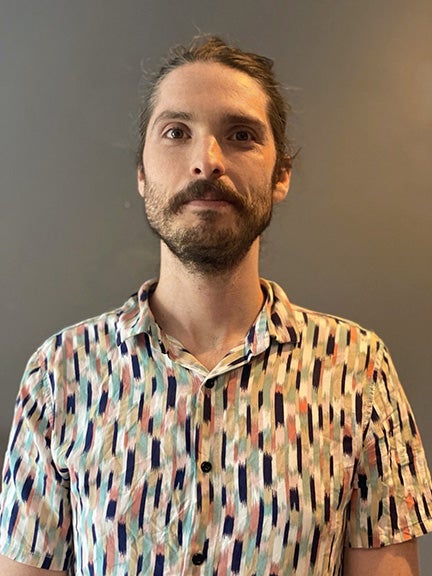KINGSTON, R.I. — June 17, 2021 — Shawn Fennell, a first-year international relations graduate student from the University of Rhode Island, has been awarded a U.S. Department of State Critical Language Scholarship to study Arabic this summer.
Born in Hialeah, Florida, Fennell was raised with a mixed Cuban and Irish heritage and attributes growing up in a bilingual household to developing an affinity towards different languages and cultures. But even after graduating with a bachelor’s degree in comparative literature from Princeton University, Fennell wasn’t quite sure which career path he should focus on.
“I didn’t quite know what I was getting educated for and ended up leaving Princeton with one course deficient,” Fennell said. “At the right time, a friend of mine was opening a non-profit arts organization in Rhode Island and asked me to help. That’s how I came here. I eventually took my last course at URI and finished my degree. URI helped me finish what I started.”
Fennell spent the next two years travelling across Portugal and Morocco, where he eventually found his passion for Arabic.
“My bus arrived in Fez at 2 in the morning and my hostel was closed, everything was shut down, and I had nowhere else to go,” said Fennell. “My cabby immediately offered to let me stay at his place for the night. Even though, in retrospect, it seems reckless to have accepted his offer, I quickly learned that he was a recently divorced single father, struggling to make ends meet with his son, who willingly helped me at a time of need. That offer was very much an Arab thing and it piqued my interest to understand more about that culture.”
Fennell recalls always having a facility with communication and politics, and deeply cares about cultivating peace in the world. This interest in languages and politics eventually brought him to the Department of Political Science at URI to pursue a master’s degree in international relations while also taking Arabic classes.
“I talked to graduate program director Kristin Johnson about wanting to learn Arabic as well, before I applied,” said Fennell. “The department also wanted to begin piloting a program where students in the international relations program could take Arabic language classes, so it all came together at the right time.”
The Critical Language Scholarship (CLS) Program is an intensive overseas language and cultural immersion program for American students enrolled at U.S. colleges and universities. Students typically spend eight to 10 weeks abroad studying one of 15 critical languages. The program includes intensive language instruction and structured cultural enrichment experiences designed to promote rapid language gains, and has a 10 percent acceptance rate.
However, because of the pandemic, Fennell, who was originally selected for the CLS program based in Oman, will be taking classes remotely this summer. He still hopes to make the most of the experience.
“It’s not going to be the same now that it’s virtual,” said Fennell, who lives in Providence. “However, my whole first year of my master’s program was entirely virtual and I was still able to get a strong sense of discipline and a dive into new learning materials. Moreover, I’m only familiar with colloquial Arabic whereas the one this program focuses on is Fusha Arabic, which is the classical literary form. So even though I may not have a strong sense of place and community, it will still be an exciting chance to shore up my shortcomings within the language.”
At the same time, Fennell said the CLS program will help him extend his master’s degree research on how internet access and social media technologies alter political landscapes and engage individuals, focusing on social media activities in the Arabic language. He is also interested in producing critical research analysis such as devising a research design to learn more about domestic labor in places like Lebanon, which is facing both a COVID-19 and financial crisis.
“A lot of domestic workers are migrant domestic workers who are under this rigorous sponsorship or contract and have very little social protection,” said Fennell. “I would hopefully like to actually go to these places, interview them, and relate to people in that culture.”
Fennell is grateful to the faculty in the Department of Political Science and the URI community for helping him get the scholarship and focus on his passion.
“The community has given me the opportunity to break barriers through language and opened up the space to potentially do real good, not just in terms of research work but also humanitarian work,” Fennell said.
URI students interested in applying to the CLS program are encouraged to contact Kathleen Maher in URI’s Office of National Fellowships and Academic Opportunities for guidance.
Edhaya Thennarasu, an intern in the Marketing and Communications Department at URI and Communications major, wrote this press release.

